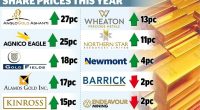
In this series, we bust the jargon and explain a popular investing term or theme. Here it’s high beta.
This sounds like a health food, but I dare say that’s not the case
You’d be right. The beta of a stock is a measure of its volatility in relation to a stock market index, such as the FTSE 100 or the US S&P 500.
As the benchmark, the index has a beta of 1. If the ups and downs of a stock are less than those of the index, it will have a beta of below 1.
But if its gyrations are greater than those of the index, its beta will be above 1 and regarded as high.
A stock with a beta of 2 should outperform the wider market when the index is moving upwards – but fare less well than other stocks when the trend is downwards.

Taking a risk: If you have strong nerves, high beta shares could be your thing, so long as you can cleverly time the moment when you buy and when you sell
Checking out the beta scores of the FTSE 100 is interesting. Ocado has a beta of 3.55, while AstraZeneca’s beta is 0.55.
What’s the message from this?
If you have strong nerves, high beta shares could be your thing, so long as you can cleverly time the moment when you buy and when you sell. But do not expect that this strategy will provide a payback. Before buying a high beta share, you need to be assured that the potential rise in the share price compensates for the risk.
Why is that?
Surprisingly stocks with a lower beta have historically have offered higher returns than those with higher betas.
This phenomenon, first observed about 50 years ago – and endlessly examined ever since by economists and stock market analysts, is called the low beta anomaly’ or the ‘low beta premium’
There have been vast amounts of ‘deep dive’ research into the reasons why low beta or ‘low vol’ stocks provide better payback. Some argue that it arises from the ways in which fund managers select stocks – which may be subject to several types of bias. There may also be an element of overconfidence in the prospects of high beta stocks.
Why are we reading about this?
More attention is being paid to high betas amid speculation over the next moves in the shares of the Magnificent Seven tech titans.
The soaraway prices of the Mag 7 have delighted investors, but recent declines caused dismay, although these falls were short-lived.
Microsoft has a beta of 0.88, while Alphabet, owner of Google has a beta of 1.03. The other scores are Amazon – 1.15, Apple 1.27, Meta – 1.17 and Nvida – 1.76 .Tesla’s beta is 2.47. This is a strong indication that there may be more sharp fluctuations for the electric car maker – which may be one reason why the majority of analysts rate Tesla a ‘hold’ rather than a ‘buy’.









